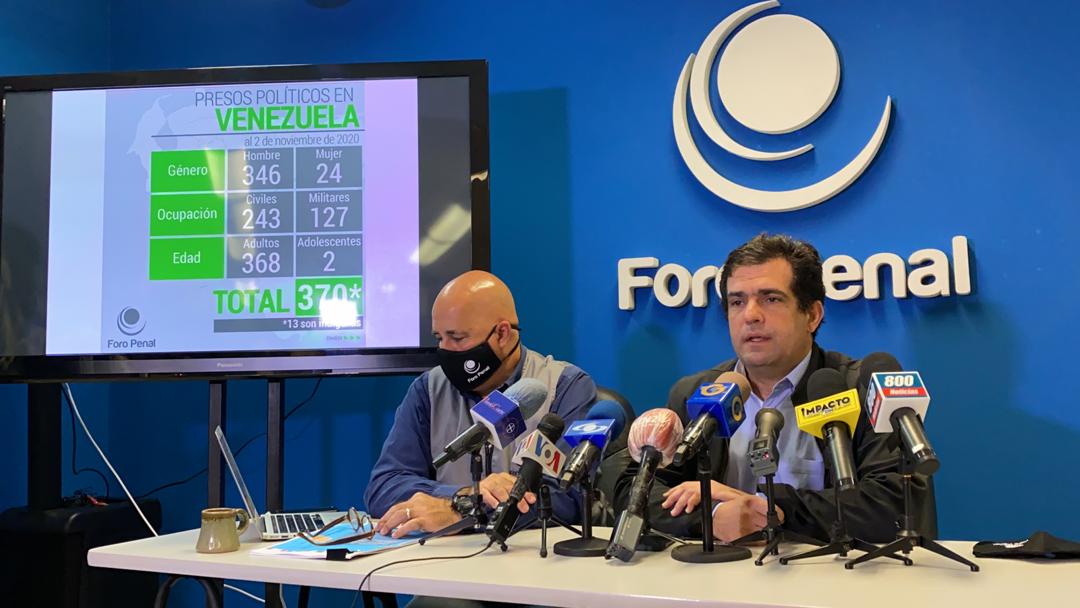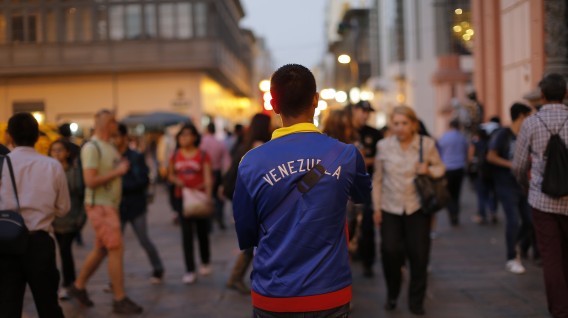In just four years after graduating, the young lawyer Mario D’Andrea has forged an admirable career: he began working in the fields of human rights in 2014 as a student at the Andrés Bello Catholic University, where, in addition to studying law, he became a volunteer for the University’s Human Rights Center (CDH-UCAB) in the framework of the 2014 and 2017 mass protests in Venezuela. As a professional, he has worked for the organizations Defiende Venezuela, Civilis Human Rights, and Compromiso Compartido. Since 2019, he has received several scholarships from foreign institutions, the most recent being the Human Rights Institute of Columbia University, in New York, for the Human Rights Advocate Program 2021-2022, becoming the first Venezuelan accepted into the program. Concerning the bill on International Cooperation that is currently being discussed by the government-controlled National Assembly, he has no doubts about the damage it would cause to the national civic space and the thousands of people who benefit from the work of non-governmental organizations amid the Complex Humanitarian Emergency
The bill on international cooperation became known for the first time in 2015; however, its approval did not materialize and now it is being discussed by Parliament again. Why do you think it comes out again at this time?
This is a bill that has been recycled over and over again since 2005, and does not advance from the first discussion, which in my opinion based on the interpretation of the modifications to the explanatory statement, indicates a marked political nature; Therefore, it may be convenient for the political calculations of the government of Nicolás Maduro at this time to further exert pressure and narrow the civic space. I believe that this is also because there is no strong competition in electoral matters and the opposition is scarcely effective, making civil society be perceived as the strongest rival of the State in its broader sense, not only including non-governmental organizations but also unions, universities, professional associations, etc. The State is setting its eyes on non-governmental organizations because they have documented and communicated the ravages of the Complex Humanitarian Emergency and the crimes against human rights that occur in the country.
What are the changes in the bill’s explanatory statement?
The first thing anyone who wants to know the bill has to do is read the explanatory statement because it expresses the subjective intention of the legislator; that is, the reasons why the legislator believes it convenient to write. If you read the explanatory statement of this bill, you will see that there are many political elements; you will see and recognize that it has a different approach to what is understood by international cooperation, which is to protect development, facilitate cooperation between protection organizations and civil society, and even the constitutional mandate that the State has to cooperate internationally with other governments in serious circumstances. The subjective intention of the legislator in this case has a very strong political bias.
The second thing is reading article number 26 and its very serious punitive element under which an organization, foundation or civil association that has directly or indirectly helped in the implementation of sanctions can be eliminated, suppressed or suspended. There is even a mistaken terminology because civil associations are defined as a group of people who come together for a lawful purpose or to pursue a lawful purpose, so it is not correct to say that civil associations will be eliminated rather than dissolve when the reasons for which they were created have been fulfilled or satisfied. That said, according to this project, there might be the case of, for example, NGOs or unions that document human rights violations or situations that violate human rights having their work outlawed or their organization suppressed, if their information gives rises to the United States, the European Union, Canada, Switzerland or any country issuing sanctions against a government official, given that the State may interpret the decision as a result of the documentation, denunciation or dissemination work of the organization, and the sanction occurred because that organization or union helped directly or indirectly.
Also, according to international human rights standards, any restriction of rights must be based on a law that follows the formal procedure. However, this bill does not establish how this process of suppression or elimination of organizations, unions, and associations shall take place, and it will be decided according to the law’s regulation instead, a norm of sub-legal rank that will be dictated by the Executive branch. Therefore, the bill does not even establish a due process in describing how the procedure for the administration of sanctions will unfold, having, in consequence, a very serious sanctioning effect.
The other element is the register. Already in 2021, civil society raised its voice against the creation of an office against terrorism in which organizations must register. The bill also establishes the registration before a new body under the control of the Executive branch that will also require the submission of the organizations’ minutes and other documentation that many organizations do not have because they have not been allowed to register this type of information for a few years now. Therefore, we are in front of a material impossibility derived from the State itself. Also, this register seems to function as an authorization to operate, although it is a formal authorization, given that, under the bill, if the organization fails to register, it does not exist to the State and is therefore receiving funds illegitimately, thus justifying a de facto banning.
The third serious thing about this bill is that it will substitute the current law dating from 1958, which regulates the cooperation of the Republic of Venezuela with foreign entities. The law essentially regulates the actions of the State rather than private actors, including universities, non-governmental organizations, trade unions, etc. Therefore, the State now holds that private actors are not regulated and need to be regulated, at the same time that the State is being deregulated because the bill focuses on civil society and private actors, while it considers that there should be no control or regulation for the State. Also very serious is the reference made to the Constitutional laws passed by the Constituent Assembly, including the anti-blockade law, whose purpose remains unclear and has only served for the de facto privatization of public assets. So, if the State is deregulated and the anti-blockade law is applied, there will be a total lack of transparency.
With this panorama, what can civil society do to counteract the progress of this bill?
A group of organizations recently met with Gianluca Rampolla del Tindaro, United Nations Resident Coordinator of the United Nations in Venezuela, to explain our concerns regarding the bill. However, his response was a little passive, and more than anything he showed concern about the register. Also, campaigns have been carried out and will continue to be carried out, and other meetings are expected.
Do you think it is necessary to create a new law to regulate international cooperation?
This is a subjective discussion because one would have to ask whether international cooperation with private individuals, universities, unions, non-profit civil associations, etc., has presented any problem that makes it necessary to regulate. I think it has not, but from a political perspective, the State is going to say it has because the interim government led by Juan Guaidó created organizations and other entities to administer funds from abroad that have been misused. That is a political argument, but not a legal one, no serious organization in the country has been denounced for fraud, and no one has ever been arrested for that reason; that is, there is no reason to regulate private entities.

Besides organizations, unions, associations, or universities, how would this bill affect the population if approved?
If this bill is approved, all cooperation will disappear because international sources will not give cooperation resources to a State that does not publish figures or a national budget in the last four years and remains very obscure in the management of resources. So, in the end, those who lose are not only the organizations, unions, or universities but also the people who benefit from their work. The population will be affected to the extent that all cooperation, support, and solidarity obtained by non-governmental organizations, unions, universities, and civil associations will go into a fund that will be governed by the principles established by the State and managed by the state. The people will be the most affected because they will be left without soup kitchens, access to education and research, and medication provided by the organizations in an effort to cover the responsibilities of the State, among many other benefits they receive.
Is there anywhere in the world where the State receives international cooperation resources directed to private parties?
This happens in Nicaragua, which worries us a lot because it sets an example. As early as 2016, we started to warn of a Complex Humanitarian Emergency in Venezuela and the situation of hunger and human rights violations in the country that was going to cause a major problem, but the United Nations system failed to listen until the people started to leave as migrants. In this case, they are warning about the closure of civic space, as has happened in Nicaragua, and that regulations are being established to close organizations in the near future, and they are not listening to us.
If society is curtailed and restricted in the mechanisms that allow it to alleviate and overcome the Complex Humanitarian Emergency, the situation is obviously going to get worse. This bill is a sword of Damocles for civil society in its broader sense because it does not limit to non-governmental organizations, but rather includes unions, universities, associations, and all private actors that receive international cooperation.
Translated by Jose Rafael Medina




